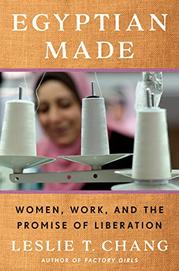Award-winning journalist Chang, author of Factory Girls, brings an informed historical and cultural perspective to this close look at women’s lives in contemporary Egypt. Beginning in the 1980s with the spread of fundamentalist ideas, an increasingly conservative society has circumscribed women’s freedom, making them a minority of the nation’s workforce and impeding them from gaining social, economic, and political benefits from job opportunities afforded to women in other modernizing countries. In Egypt, Chang found, women wanting to work outside the home confront stubborn opposition from their families, fiances, and husbands: “The end goal is predetermined—to marry, quit, and become a homemaker.” The author focuses on three women working in the textile and garment industry: Rania, ambitious and skilled, who rose to become a supervisor; Doaa, a factory security guard who is continuing her education, with aspirations to become a social worker; and Riham, who earned a college degree in production engineering and rejected working for her family’s textile business to establish her own clothing factory. For Rania, trapped in a bad marriage, the workplace served as “a place of refuge.” For Doaa, who divorced her husband, and in doing so was forced to give up custody of her daughters, work meant independence. For Riham, running a factory meant having a chance to innovate. Unlike these women, many others have been undermined by poor-quality education, especially in rural areas; and some who get jobs often balk at workplace demands, taking breaks to eat at their work area or simply leave. Factory employees “might quit on a whim or vanish for a month, cry at the sight of new technology, or fall asleep in the bathroom.” Drawing on perceptive observations and interviews, Chang reveals a society “not developed enough to benefit from globalization,” where misogyny and patriarchy stifle women’s potential.

